2021年高中生英语写作中英汉文化差异困境与对策
- 格式:doc
- 大小:16.45 KB
- 文档页数:5
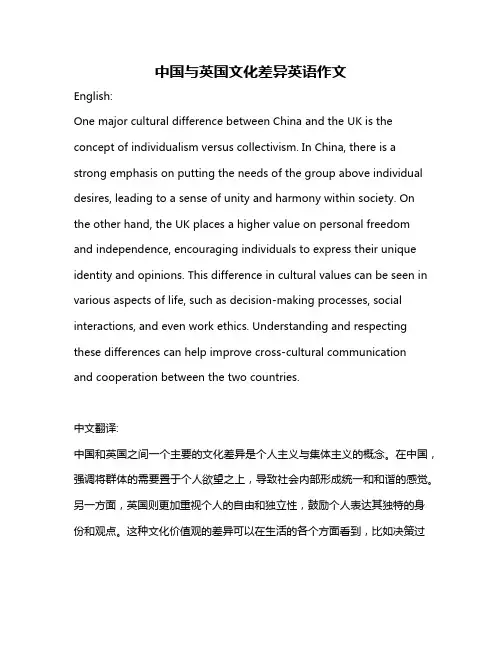
中国与英国文化差异英语作文English:One major cultural difference between China and the UK is the concept of individualism versus collectivism. In China, there is a strong emphasis on putting the needs of the group above individual desires, leading to a sense of unity and harmony within society. On the other hand, the UK places a higher value on personal freedom and independence, encouraging individuals to express their unique identity and opinions. This difference in cultural values can be seen in various aspects of life, such as decision-making processes, social interactions, and even work ethics. Understanding and respecting these differences can help improve cross-cultural communicationand cooperation between the two countries.中文翻译:中国和英国之间一个主要的文化差异是个人主义与集体主义的概念。
在中国,强调将群体的需要置于个人欲望之上,导致社会内部形成统一和和谐的感觉。
另一方面,英国则更加重视个人的自由和独立性,鼓励个人表达其独特的身份和观点。
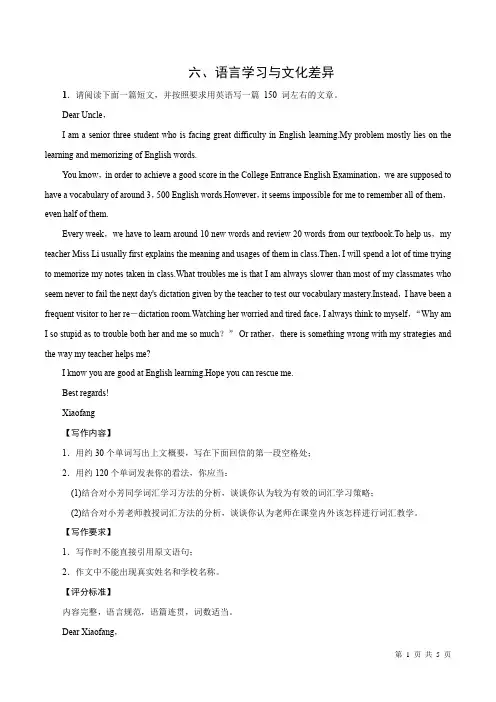
六、语言学习与文化差异1.请阅读下面一篇短文,并按照要求用英语写一篇150 词左右的文章。
Dear Uncle,I am a senior three student who is facing great difficulty in English learning.My problem mostly lies on the learning and memorizing of English words.You know,in order to achieve a good score in the College Entrance English Examination,we are supposed to have a vocabulary of around 3,500 English words.However,it seems impossible for me to remember all of them,even half of them.Every week,we have to learn around 10 new words and review 20 words from our textbook.To help us,my teacher Miss Li usually first explains the meaning and usages of them in class.Then,I will spend a lot of time trying to memorize my notes taken in class.What troubles me is that I am always slower than most of my classmates who seem never to fail the next day's dictation given by the teacher to test our vocabulary mastery.Instead,I have been a frequent visitor to her re-dictation room.Watching her worried and tired face,I always think to myself,“Why am I so stupid as to trouble both her and me so much?” Or rather,there is something wrong with my strategies and the way my teacher helps me?I know you are good at English learning.Hope you can rescue me.Best regards!Xiaofang【写作内容】1.用约30个单词写出上文概要,写在下面回信的第一段空格处;2.用约120个单词发表你的看法,你应当:(1)结合对小芳同学词汇学习方法的分析,谈谈你认为较为有效的词汇学习策略;(2)结合对小芳老师教授词汇方法的分析,谈谈你认为老师在课堂内外该怎样进行词汇教学。
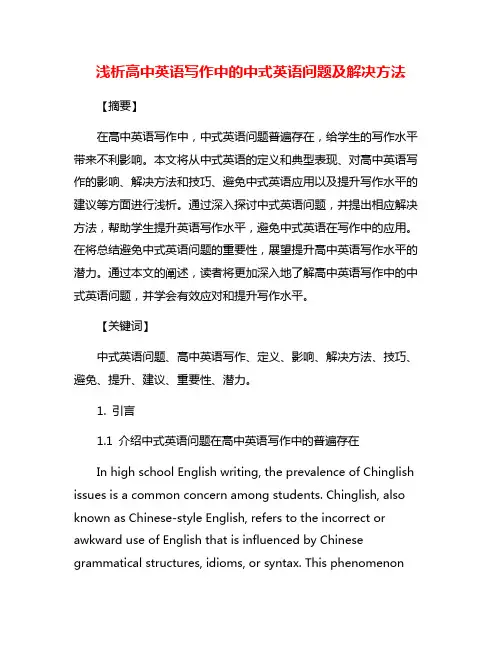
浅析高中英语写作中的中式英语问题及解决方法【摘要】在高中英语写作中,中式英语问题普遍存在,给学生的写作水平带来不利影响。
本文将从中式英语的定义和典型表现、对高中英语写作的影响、解决方法和技巧、避免中式英语应用以及提升写作水平的建议等方面进行浅析。
通过深入探讨中式英语问题,并提出相应解决方法,帮助学生提升英语写作水平,避免中式英语在写作中的应用。
在将总结避免中式英语问题的重要性,展望提升高中英语写作水平的潜力。
通过本文的阐述,读者将更加深入地了解高中英语写作中的中式英语问题,并学会有效应对和提升写作水平。
【关键词】中式英语问题、高中英语写作、定义、影响、解决方法、技巧、避免、提升、建议、重要性、潜力。
1. 引言1.1 介绍中式英语问题在高中英语写作中的普遍存在In high school English writing, the prevalence of Chinglish issues is a common concern among students. Chinglish, also known as Chinese-style English, refers to the incorrect or awkward use of English that is influenced by Chinese grammatical structures, idioms, or syntax. This phenomenonoften arises due to the influence of the student's native language and the literal translation of Chinese expressions into English.2. 正文2.1 中式英语的定义和典型表现Definition and Typical Manifestations of Chinglish in High School English WritingChinglish, also known as Chinese English, refers to a mixed language that combines elements of both Chinese and English. It often occurs when Chinese speakers directly translate Chinese expressions or grammar structures into English, leading to unnatural or incorrect language use. This phenomenon is commonly observed in high school English writing due to the influence of students' native language and lack of exposure to authentic English language usage.2.2 中式英语对高中英语写作的影响中式英语会影响文章的流畅性和连贯性。
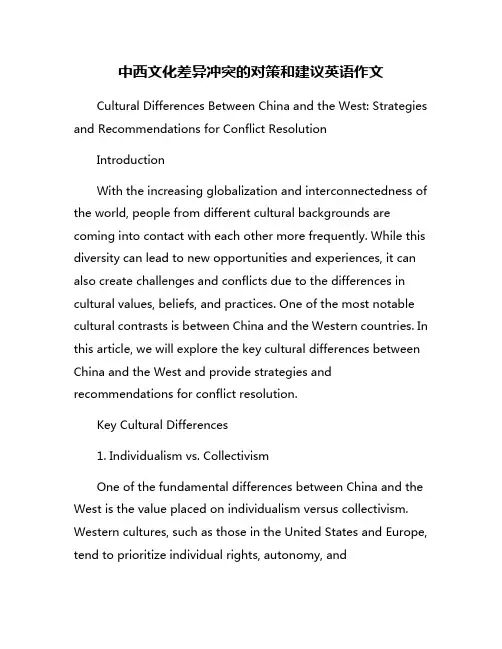
中西文化差异冲突的对策和建议英语作文Cultural Differences Between China and the West: Strategies and Recommendations for Conflict ResolutionIntroductionWith the increasing globalization and interconnectedness of the world, people from different cultural backgrounds are coming into contact with each other more frequently. While this diversity can lead to new opportunities and experiences, it can also create challenges and conflicts due to the differences in cultural values, beliefs, and practices. One of the most notable cultural contrasts is between China and the Western countries. In this article, we will explore the key cultural differences between China and the West and provide strategies and recommendations for conflict resolution.Key Cultural Differences1. Individualism vs. CollectivismOne of the fundamental differences between China and the West is the value placed on individualism versus collectivism. Western cultures, such as those in the United States and Europe, tend to prioritize individual rights, autonomy, andself-expression. In contrast, Chinese culture emphasizes the importance of the group and the harmony of society.2. Communication StyleChinese communication tends to be more indirect and implicit, with a focus on preserving face and maintaining harmonious relationships. Western communication, on the other hand, is more direct and explicit, with an emphasis on clarity and efficiency.3. Concept of TimeWestern cultures typically place a high value on punctuality and efficiency, with time seen as a limited resource that must be managed effectively. In contrast, Chinese culture values flexibility and adaptability, with time seen as fluid and malleable.4. Hierarchical vs. EgalitarianChinese society tends to be more hierarchical, with a clear emphasis on status and rank. Western societies, on the other hand, are more egalitarian, with a focus on equality and meritocracy.Strategies for Conflict Resolution1. Cultural Awareness and SensitivityThe first step in resolving conflicts between Chinese and Western cultures is to develop a deeper understanding of the cultural differences and how they impact communication, behavior, and relationships. By increasing cultural awareness and sensitivity, individuals can avoid misunderstandings and bridge the gap between the two cultures.2. Effective CommunicationEffective communication is essential for resolving conflicts in any cultural context. In the case of Chinese-Western interactions, it is important to strike a balance between directness and indirectness, taking into account the cultural preferences of each party. Clear and open communication, combined with active listening and empathy, can help prevent misunderstandings and build trust.3. Respect and EmpathyRespect for cultural differences and empathy for the perspectives of others are crucial for conflict resolution. Instead of imposing one's own cultural norms and values on others, individuals should strive to understand and appreciate the cultural context of the other party. By showing respect and empathy, conflicts can be de-escalated and mutual understanding can be fostered.Recommendations for Conflict Resolution1. Seek Common GroundDespite the differences between Chinese and Western cultures, there are also shared values and goals that can serve as a basis for collaboration and conflict resolution. By identifying and focusing on common ground, such as mutual respect, trust, and cooperation, individuals can overcome cultural barriers and work towards a resolution.2. Collaborative Problem-SolvingCollaborative problem-solving is an effective approach for resolving conflicts between different cultures. By engaging in open and transparent dialogue, exploring multiple perspectives, and seeking win-win solutions, individuals can address underlying issues and build sustainable relationships. In the case of Chinese-Western conflicts, a collaborative approach can help bridge the cultural divide and promote mutual understanding.3. Third-Party MediationIn cases where conflicts between Chinese and Western cultures cannot be resolved through direct communication, third-party mediation can be a valuable option. A neutral mediator with expertise in cross-cultural communication canhelp facilitate dialogue, clarify misunderstandings, and guide the parties towards a mutually acceptable resolution. By involving a mediator, individuals can overcome cultural barriers and reach a sustainable agreement.ConclusionConflicts between Chinese and Western cultures are inevitable in the globalized world. By recognizing the key cultural differences, developing strategies for conflict resolution, and implementing recommendations for mutual understanding, individuals can navigate these cultural divides and build harmonious relationships. With cultural awareness, effective communication, respect, empathy, and collaborativeproblem-solving, conflicts can be resolved, and bridges can be built between China and the West.。
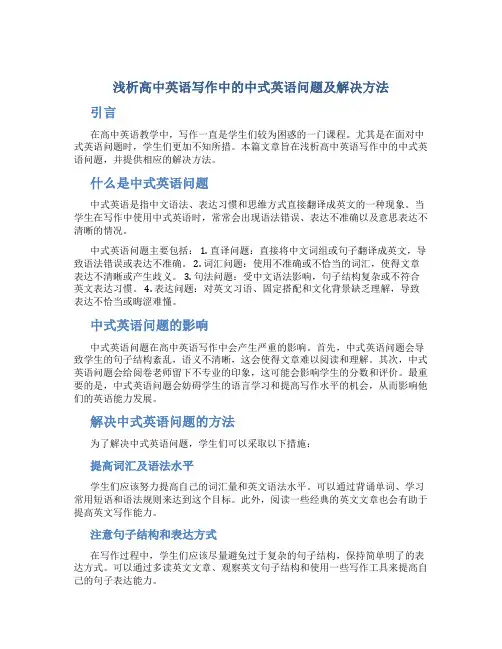
浅析高中英语写作中的中式英语问题及解决方法引言在高中英语教学中,写作一直是学生们较为困惑的一门课程。
尤其是在面对中式英语问题时,学生们更加不知所措。
本篇文章旨在浅析高中英语写作中的中式英语问题,并提供相应的解决方法。
什么是中式英语问题中式英语是指中文语法、表达习惯和思维方式直接翻译成英文的一种现象。
当学生在写作中使用中式英语时,常常会出现语法错误、表达不准确以及意思表达不清晰的情况。
中式英语问题主要包括: 1. 直译问题:直接将中文词组或句子翻译成英文,导致语法错误或表达不准确。
2. 词汇问题:使用不准确或不恰当的词汇,使得文章表达不清晰或产生歧义。
3. 句法问题:受中文语法影响,句子结构复杂或不符合英文表达习惯。
4. 表达问题:对英文习语、固定搭配和文化背景缺乏理解,导致表达不恰当或晦涩难懂。
中式英语问题的影响中式英语问题在高中英语写作中会产生严重的影响。
首先,中式英语问题会导致学生的句子结构紊乱,语义不清晰,这会使得文章难以阅读和理解。
其次,中式英语问题会给阅卷老师留下不专业的印象,这可能会影响学生的分数和评价。
最重要的是,中式英语问题会妨碍学生的语言学习和提高写作水平的机会,从而影响他们的英语能力发展。
解决中式英语问题的方法为了解决中式英语问题,学生们可以采取以下措施:提高词汇及语法水平学生们应该努力提高自己的词汇量和英文语法水平。
可以通过背诵单词、学习常用短语和语法规则来达到这个目标。
此外,阅读一些经典的英文文章也会有助于提高英文写作能力。
注意句子结构和表达方式在写作过程中,学生们应该尽量避免过于复杂的句子结构,保持简单明了的表达方式。
可以通过多读英文文章、观察英文句子结构和使用一些写作工具来提高自己的句子表达能力。
学习习语和固定搭配在提高写作水平的过程中,学习英文习语和固定搭配是非常重要的。
习语和固定搭配在英语写作中具有重要的作用,能够使句子更加地流畅和生动。
学生们可以通过阅读英文小说、报纸和杂志来积累习语和固定搭配的使用。
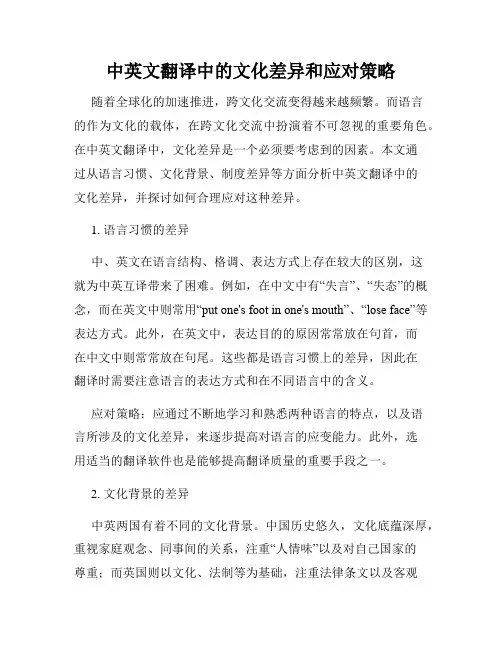
中英文翻译中的文化差异和应对策略随着全球化的加速推进,跨文化交流变得越来越频繁。
而语言的作为文化的载体,在跨文化交流中扮演着不可忽视的重要角色。
在中英文翻译中,文化差异是一个必须要考虑到的因素。
本文通过从语言习惯、文化背景、制度差异等方面分析中英文翻译中的文化差异,并探讨如何合理应对这种差异。
1. 语言习惯的差异中、英文在语言结构、格调、表达方式上存在较大的区别,这就为中英互译带来了困难。
例如,在中文中有“失言”、“失态”的概念,而在英文中则常用“put one's foot in one's mouth”、“lose face”等表达方式。
此外,在英文中,表达目的的原因常常放在句首,而在中文中则常常放在句尾。
这些都是语言习惯上的差异,因此在翻译时需要注意语言的表达方式和在不同语言中的含义。
应对策略:应通过不断地学习和熟悉两种语言的特点,以及语言所涉及的文化差异,来逐步提高对语言的应变能力。
此外,选用适当的翻译软件也是能够提高翻译质量的重要手段之一。
2. 文化背景的差异中英两国有着不同的文化背景。
中国历史悠久,文化底蕴深厚,重视家庭观念、同事间的关系,注重“人情味”以及对自己国家的尊重;而英国则以文化、法制等为基础,注重法律条文以及客观公正的原则。
这种文化背景的差异常常因不同的语言表达而产生翻译上的偏差和误解。
应对策略:在翻译时,必须要考虑到源语言和目标语言之间的文化背景差异,以及这种差异所反映的思维方式和价值观。
因此,在进行中英互译时,要在语言上精准地表达出这种文化背景的内涵和特点。
3. 制度差异的差异中国和英国则在制度方面存在着较大的差异。
例如,中国社会的组织结构比较松散,不像英国一样有严格的等级制度;中国拥有的中文官方用语体系在英国并不存在。
因此,在翻译时需要充分了解两国之间的制度差异,这是避免翻译错误和误解的重要一环。
应对策略:在翻译中需要尊重两国之间的制度差异,合理应对这种差异,以确保正确、准确地表达文本中涉及的概念,也避免在翻译过程中新增过多的意译内容。
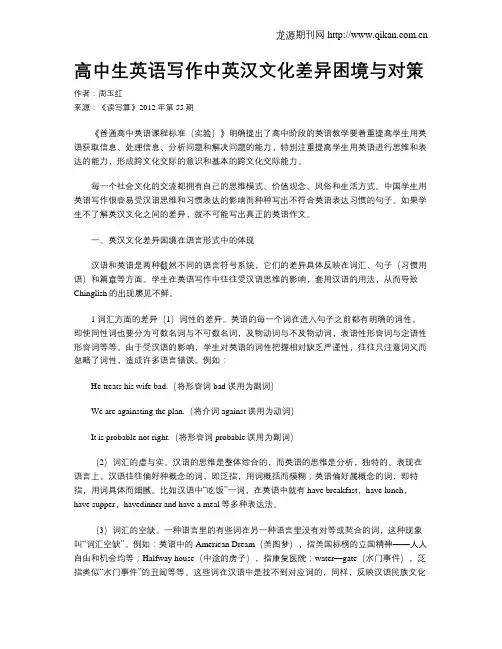
高中生英语写作中英汉文化差异困境与对策作者:周玉红来源:《读写算》2012年第55期《普通高中英语课程标准(实验)》明确提出了高中阶段的英语教学要着重提高学生用英语获取信息、处理信息、分析问题和解决问题的能力,特别注重提高学生用英语进行思维和表达的能力,形成跨文化交际的意识和基本的跨文化交际能力。
每一个社会文化的交流都拥有自己的思维模式、价值观念、风俗和生活方式。
中国学生用英语写作很容易受汉语思维和习惯表达的影响而种种写出不符合英语表达习惯的句子。
如果学生不了解英汉文化之间的差异,就不可能写出真正的英语作文。
一、英汉文化差异困境在语言形式中的体现汉语和英语是两种截然不同的语言符号系统,它们的差异具体反映在词汇、句子(习惯用语)和篇章等方面。
学生在英语写作中往往受汉语思维的影响,套用汉语的用法,从而导致Chinglish的出现屡见不鲜。
1 词汇方面的差异(1)词性的差异。
英语的每一个词在进入句子之前都有明确的词性,即使同性词也要分为可数名词与不可数名词,及物动词与不及物动词,表语性形容词与定语性形容词等等。
由于受汉语的影响,学生对英语的词性把握相对缺乏严谨性,往往只注意词义而忽略了词性,造成许多语言错误。
例如:He treats his wife bad.(将形容词bad误用为副词)We are againsting the plan.(将介词against误用为动词)It is probable not right.(将形容词probable误用为副词)(2)词汇的虚与实。
汉语的思维是整体综合的,而英语的思维是分析,独特的。
表现在语言上,汉语往往偏好种概念的词,即泛指,用词概括而模糊;英语偏好属概念的词,即特指,用词具体而细腻。
比如汉语中“吃饭”一词,在英语中就有have breakfast,have lunch,have supper,havedinner and have a meal等多种表达法。
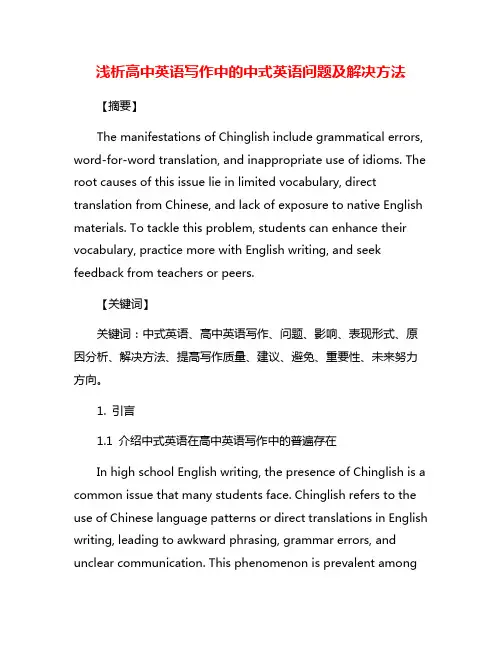
浅析高中英语写作中的中式英语问题及解决方法【摘要】The manifestations of Chinglish include grammatical errors, word-for-word translation, and inappropriate use of idioms. The root causes of this issue lie in limited vocabulary, direct translation from Chinese, and lack of exposure to native English materials. To tackle this problem, students can enhance their vocabulary, practice more with English writing, and seek feedback from teachers or peers.【关键词】关键词:中式英语、高中英语写作、问题、影响、表现形式、原因分析、解决方法、提高写作质量、建议、避免、重要性、未来努力方向。
1. 引言1.1 介绍中式英语在高中英语写作中的普遍存在In high school English writing, the presence of Chinglish is a common issue that many students face. Chinglish refers to the use of Chinese language patterns or direct translations in English writing, leading to awkward phrasing, grammar errors, and unclear communication. This phenomenon is prevalent amonghigh school students who are not yet proficient in English and often rely on direct translations from Chinese to English.1.2 分析中式英语问题对写作质量的影响When it comes to high school English writing, the issue of Chinglish, or Chinese-style English, is a prevalent problem that significantly impacts the quality of students' writing. Chinglish refers to the incorrect or awkward use of English language structures, vocabulary, and idioms that result from direct translation from Chinese. This phenomenon not only hinders the clarity and coherence of the writing but also reflects a lack of proficiency in English language skills.2. 正文2.1 中式英语问题的表现形式1. 词汇选择不当:学生常常会直译中文词汇或短语,导致用词不准确或使用别扭。
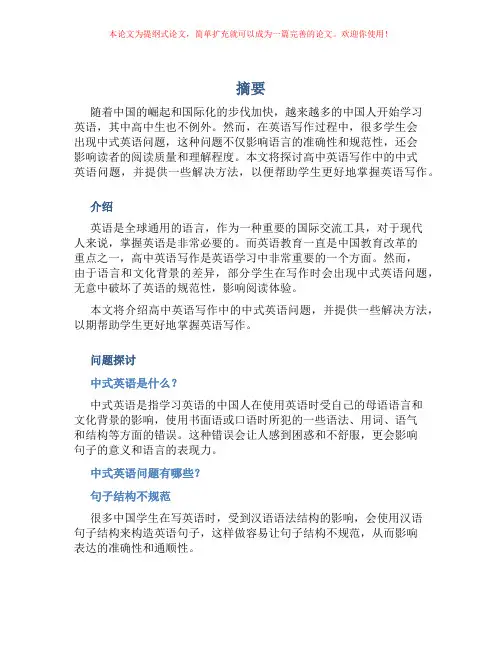
摘要随着中国的崛起和国际化的步伐加快,越来越多的中国人开始学习英语,其中高中生也不例外。
然而,在英语写作过程中,很多学生会出现中式英语问题,这种问题不仅影响语言的准确性和规范性,还会影响读者的阅读质量和理解程度。
本文将探讨高中英语写作中的中式英语问题,并提供一些解决方法,以便帮助学生更好地掌握英语写作。
介绍英语是全球通用的语言,作为一种重要的国际交流工具,对于现代人来说,掌握英语是非常必要的。
而英语教育一直是中国教育改革的重点之一,高中英语写作是英语学习中非常重要的一个方面。
然而,由于语言和文化背景的差异,部分学生在写作时会出现中式英语问题,无意中破坏了英语的规范性,影响阅读体验。
本文将介绍高中英语写作中的中式英语问题,并提供一些解决方法,以期帮助学生更好地掌握英语写作。
问题探讨中式英语是什么?中式英语是指学习英语的中国人在使用英语时受自己的母语语言和文化背景的影响,使用书面语或口语时所犯的一些语法、用词、语气和结构等方面的错误。
这种错误会让人感到困惑和不舒服,更会影响句子的意义和语言的表现力。
中式英语问题有哪些?句子结构不规范很多中国学生在写英语时,受到汉语语法结构的影响,会使用汉语句子结构来构造英语句子,这样做容易让句子结构不规范,从而影响表达的准确性和通顺性。
用词不准确中式英语用词不准确常常因为中国学生在选用词语时易受中文表达方式的影响或者词汇量不足,使用错误达不到表达的效果。
翻译错误由于语言和文化背景的差异,学生在翻译中容易出现一些错误,例如中译英时翻译错意,或翻译后的语法结构不符合英语的语法习惯等。
解决方法提高英语语法知识水平英语语法是英语写作的基础,掌握语法是正确表达的基础。
学生可以通过背记规则、进行习题练习、写短文练习等方式来提高自己的写作能力以及语法水平。
练习写作,提高表达能力英语写作的能力需要不断练习才能掌握,学生可以通过课堂上的作文练习、课外阅读、课堂讨论等练习写作以及表达的能力。
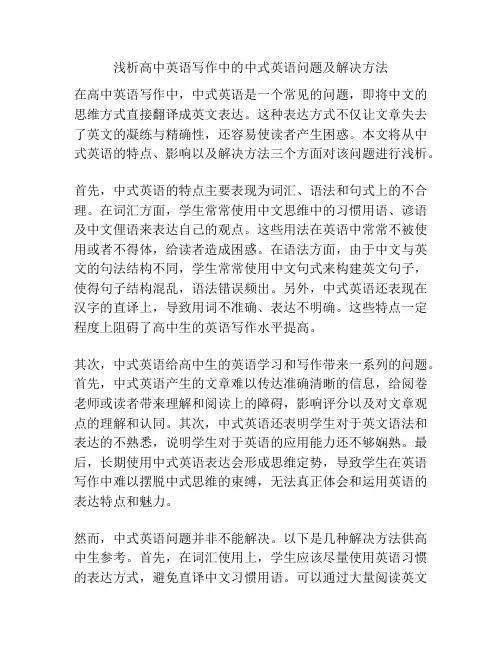
浅析高中英语写作中的中式英语问题及解决方法在高中英语写作中,中式英语是一个常见的问题,即将中文的思维方式直接翻译成英文表达。
这种表达方式不仅让文章失去了英文的凝练与精确性,还容易使读者产生困惑。
本文将从中式英语的特点、影响以及解决方法三个方面对该问题进行浅析。
首先,中式英语的特点主要表现为词汇、语法和句式上的不合理。
在词汇方面,学生常常使用中文思维中的习惯用语、谚语及中文俚语来表达自己的观点。
这些用法在英语中常常不被使用或者不得体,给读者造成困惑。
在语法方面,由于中文与英文的句法结构不同,学生常常使用中文句式来构建英文句子,使得句子结构混乱,语法错误频出。
另外,中式英语还表现在汉字的直译上,导致用词不准确、表达不明确。
这些特点一定程度上阻碍了高中生的英语写作水平提高。
其次,中式英语给高中生的英语学习和写作带来一系列的问题。
首先,中式英语产生的文章难以传达准确清晰的信息,给阅卷老师或读者带来理解和阅读上的障碍,影响评分以及对文章观点的理解和认同。
其次,中式英语还表明学生对于英文语法和表达的不熟悉,说明学生对于英语的应用能力还不够娴熟。
最后,长期使用中式英语表达会形成思维定势,导致学生在英语写作中难以摆脱中式思维的束缚,无法真正体会和运用英语的表达特点和魅力。
然而,中式英语问题并非不能解决。
以下是几种解决方法供高中生参考。
首先,在词汇使用上,学生应该尽量使用英语习惯的表达方式,避免直译中文习惯用语。
可以通过大量阅读英文原著和英文报刊来拓宽词汇量和提高表达能力。
其次,在语法和句式上,学生应该多注意英文的句法结构,尤其是主谓宾的基本结构。
同时,学生也应该积极进行语法知识的学习,系统地掌握英语语法规则和语法用法。
此外,学生还可以通过反复练习英语短文写作,模仿优秀篇章的结构和表达方式,培养自己英文写作的感觉和习惯。
此外,学生还可以通过提高英文阅读能力来解决中式英语问题。
通过阅读经典英文文章、英文报刊和网站的英文文章,学生可以了解到英语的表达方式和固定搭配,积累掌握更多地英文表达的方式,是提高英语写作水平的关键。
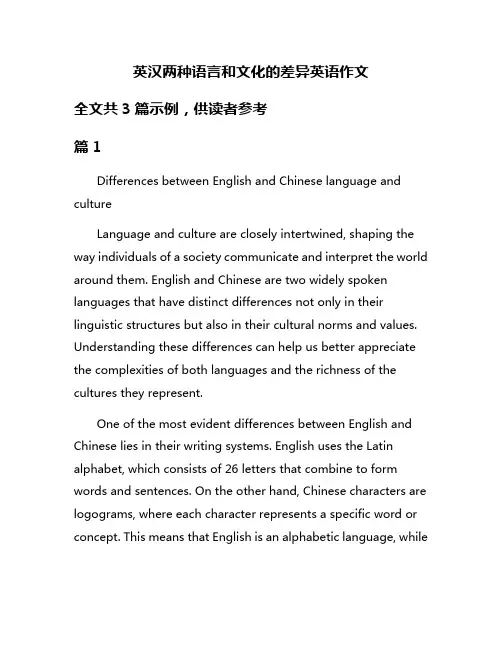
英汉两种语言和文化的差异英语作文全文共3篇示例,供读者参考篇1Differences between English and Chinese language and cultureLanguage and culture are closely intertwined, shaping the way individuals of a society communicate and interpret the world around them. English and Chinese are two widely spoken languages that have distinct differences not only in their linguistic structures but also in their cultural norms and values. Understanding these differences can help us better appreciate the complexities of both languages and the richness of the cultures they represent.One of the most evident differences between English and Chinese lies in their writing systems. English uses the Latin alphabet, which consists of 26 letters that combine to form words and sentences. On the other hand, Chinese characters are logograms, where each character represents a specific word or concept. This means that English is an alphabetic language, whileChinese is logographic, which influences the way speakers of each language process information and express themselves.Another key difference between English and Chinese is the grammatical structure. English has a subject-verb-object (SVO) word order, where the subject typically comes before the verb and the object after the verb. In contrast, Chinese has asubject-object-verb (SOV) word order, where the subject precedes the object and the verb comes last. This structural difference can lead to misunderstandings and confusion when speakers of one language attempt to translate into the other.Cultural differences also play a significant role in shaping the languages of English and Chinese. English-speaking culturestend to value individualism, independence, and direct communication. This is reflected in the English language, which places a strong emphasis on the use of personal pronouns and straightforward expressions. In contrast, Chinese culture values collectivism, harmony, and indirect communication. Chinese speakers are more likely to use honorifics and polite language to show respect and maintain social harmony.The concept of “face” is another cultural difference that influences the w ay languages are used. In Chinese culture, “face” refers to one's social standing and reputation, which must bemaintained and protected at all costs. This concept is reflected in the Chinese language through the use of polite forms of address and deferential language when speaking to elders or authority figures. In English-speaking cultures, “face” is less emphasized, and individuals are more likely to express their opinions and emotions openly.Food and dining customs are another area where English and Chinese cultures diverge. English cuisine is diverse and often includes meat dishes, dairy products, and baked goods. Meals are typically served in courses, with each dish highlighted for its flavors and textures. In contrast, Chinese cuisine tends to be more communal, with dishes served family-style and shared among diners. Chinese food often features rice or noodles as staples, along with a variety of vegetables, tofu, and meats cooked in flavorful sauces.In conclusion, the differences between English and Chinese language and culture are vast and varied, reflecting the unique histories, values, and customs of each society. By understanding and appreciating these differences, we can develop a greater sense of cultural awareness and empathy towards others. Language and culture are dynamic and ever-changing, and it is essential to approach them with an open mind and a willingnessto learn. Only then can we truly bridge the divide between different languages and cultures and foster mutual understanding and respect.篇2Differences Between English and Chinese Language and CultureLanguage and culture are deeply intertwined aspects of human society. Comparing English and Chinese, two vastly different languages and cultures, can offer valuable insights into the way people communicate, think, and view the world. In this essay, we will explore the differences between English and Chinese language and culture, focusing on various aspects such as grammar, vocabulary, writing systems, and cultural values.Grammar Differences:One of the significant differences between English and Chinese lies in their grammatical structures. English is an alphabetic language, with a subject-verb-object word order. It uses tenses, articles, and plural forms to convey precise meanings. In contrast, Chinese is a logographic language, with a subject-predicate-object word order. It uses tones, particles, and classifier words to convey nuances of meaning. For example,while English uses plural forms like 's' or 'es' to indicate multiple objects, Chinese uses measure words to count specific objects.Vocabulary Differences:English and Chinese also have different vocabularies due to their unique historical and cultural backgrounds. English has a rich blend of words borrowed from various languages, such as Latin, French, and German. Chinese, on the other hand, has a vast number of characters representing meanings, ideas, and concepts. While English has fewer characters, Chinese has a complex system of radicals, strokes, and character components. This leads to differences in word formation, syllable structure, and pronunciation.Writing System Differences:Another key distinction between English and Chinese is their writing systems. English uses the Latin alphabet, with 26 letters and a set of rules for spelling and pronunciation. Chinese uses characters, with thousands of symbols representing words, phrases, and idioms. Each Chinese character has its own unique stroke order, radical position, and pronunciation. Learning to write Chinese characters requires memorization, practice, and repetition, unlike English letters, which can be learned through phonics and sounds.Cultural Values Differences:English and Chinese cultures also have different values, beliefs, and practices that influence language use and communication styles. English-speaking countries often prioritize individualism, autonomy, and self-expression. In contrast, Chinese-speaking countries prioritize collectivism, harmony, and social relationships. This leads to differences in tone, politeness, and indirectness in communication. For example, English speakers may use direct language to express opinions, while Chinese speakers may use indirect language to avoid conflict.In conclusion, the differences between English and Chinese language and culture are vast and complex, reflecting the unique histories, traditions, and worldviews of their respective societies. Understanding these differences can help bridge communication gaps, foster intercultural understanding, and promotecross-cultural exchange. By appreciating the richness and diversity of both languages and cultures, we can enhance our global awareness, empathy, and respect for one another.篇3Differences between English and Chinese Language and CultureLanguage and culture are two inseparable elements that shape the identity of a group of people. When comparing English and Chinese, two of the world's most widely spoken languages, it becomes evident that their differences go beyond vocabulary and grammar. These differences reflect the unique cultural backgrounds of the speakers and have a profound impact on how communication is conducted between them. In this essay, we will discuss some of the key differences between English and Chinese language and culture.One of the most striking differences between English and Chinese is the writing system. English uses an alphabet system with 26 letters, while Chinese uses characters that represent words or syllables. This fundamental difference in writing systems also reflects the different ways in which these languages are structured. English is a phonetic language, meaning that the sounds of the words are represented by letters, while Chinese is a logographic language, where characters represent meanings.Another key difference between English and Chinese is the use of tones in Chinese. In Chinese, the meaning of a word can change depending on the tone in which it is spoken. There arefour tones in Mandarin Chinese (five in some dialects), and mastering these tones is essential for effective communication. In contrast, English does not use tones to differentiate meanings, relying instead on stress and intonation for emphasis.Cultural differences also play a significant role in shaping the languages and communication styles of English and Chinese speakers. For example, Chinese culture places a strong emphasis on hierarchy and respect for authority. This is reflected in the use of honorifics and formal language forms when addressing superiors or elders. In contrast, English-speaking cultures tend to be more egalitarian, with a greater emphasis on individualism and informality in communication.Another cultural difference between English and Chinese is the concept of face. In Chinese culture, maintaining harmony and saving face are important considerations in communication. This can manifest in indirect communication styles and the use of euphemisms to avoid causing offense. In English-speaking cultures, directness and honesty are often valued in communication, even if it means risking conflict or confrontation.Food culture is another area where English and Chinese cultures diverge. Chinese cuisine is known for its diverse flavors and use of fresh ingredients, with an emphasis on balance andharmony. Meals are often shared family-style, with a variety of dishes served at once. In contrast, English cuisine is more traditional and less diverse, with a focus on meat and potatoes. Meals are typically served in courses, with individual portions for each diner.These are just a few examples of the differences between English and Chinese language and culture. While these differences can sometimes lead to misunderstandings and challenges in communication, they also provide opportunities for cross-cultural learning and appreciation. By understanding and respecting the unique qualities of each language and culture, we can foster greater understanding and cooperation between speakers of English and Chinese.。
高中生写作中的汉式英语及其原因分析和对策摘要:随着教育部《英语新课程标准》的出台,我们可以看出新课标对中学生的写作能力提出了更高的要求。
英语写作主要是考察学生综合运用英语语言的能力,涉及到学生的词汇量,正确运用单词造句的能力,对所学语法熟练运用的能力以及能否按照英语习惯正确表达的能力。
可是在学生的写作过程中,我们常常可以看到一些生涩或是不通顺的英语,但这些英语把它们直接从字面意思按顺序翻译下来是通顺流畅的汉语, 这就是我们常常说的Chinglish ,即汉式英语。
汉式英语降低了语言表达的质量,很大程度上影响了学生的英语成绩。
本文将探讨该现象的主要表现形式及其产生原因以及如何避免产生这种现象,旨在帮助学生写出地道的英语。
关键词:英语写作;汉式英语;地道英语;错误分析;对策一、汉式英语的主要表现形式在学生的英语写作中出现的汉式英语有各种各样的表现形式。
通过对学生习作为样本,对其中出现的汉式英语经过分析和总结后,发现在词汇层面、惯用短语层面、句子层面和语篇层面都有不同程度的汉式英语出现。
(一)词汇层面的汉式英语词汇层面的汉式英语主要是指不能正确地选用词。
由于学生掌握的英语词汇有限,在其写作过程中会无意识地套用母语的思维方式和语言规则,然后再译成英语。
因此,在找不到合适的对应词的情况下,往往凭借自己已有的汉语和英语构词感觉造词,写作中也就出现了大量的汉式英语。
来看看一些例子:汉语错误表达正确表达大红 big red bright red增强经济 strengthen the economy boost the economy眼红妒忌的 red-eyed green-eyed一贫如洗 as poor as washing as poor as a church mouse笨得像猪 as stupid as a pig as stupid as a donkey 再来看几个简单的句子:汉语:你愿意参加我们的晚会吗?错误表达:Would you like to join our party on Friday?正确表达:Would you like to come to our party on Friday night?汉语:请背下这些单词。
浅析高中英语写作中的中式英语问题及解决方法中式英语是指由中国学生在英语写作中常犯的一些语法错误和使用习惯,其特点是受到汉语的影响,如中文思维、语序和常用表达方式。
这些问题在高中英语写作中尤为突出,给学生的英语学习和写作能力造成一定的困扰。
本文将从语法角度出发,对高中英语写作中的中式英语问题进行浅析,并提出相应的解决方法。
一、中式英语常见问题。
1.动词时态错误。
在英语写作中,学生常常使用中文思维,造成时态错误。
比如将过去时用于描述现在发生的事情,或者将现在时用于描述过去发生的事情等。
2.冠词的误用。
由于冠词在中文中并不明确,学生往往在英语写作中误用冠词。
比如将定冠词“the”用于泛指的情况下,或者没有使用不定冠词“a”或“an”等。
3.句子结构混乱。
中式英语的另一个典型问题是句子结构混乱。
汉语中的语法结构与英语有很大的差异,导致学生经常在写作中使用错误的句子结构。
4.词汇重复使用。
由于缺乏丰富的词汇量,在英语写作中,学生常常会重复使用相同的单词,导致文章显得单调和乏味。
5.中式思维和表达方式。
中式英语的另一个特点是受到中文思维和表达方式的影响。
学生在英语写作中常常采用中文的表达方式,造成句子不流畅或者意思不明确。
二、解决方法。
1.加强语法学习。
要解决中式英语问题,首先需要加强语法学习。
学生应该系统地学习英语的基本语法规则,包括动词时态、冠词用法和句子结构等。
可以通过参考相关教材、参加辅导班或请教老师来加强语法学习。
2.多读多写。
多读英语相关的文章和作品可以帮助学生熟悉英语的表达方式和句子结构。
同时,多写英语作文可以帮助学生提高写作能力和语感。
通过不断读写,学生可以逐渐摆脱中式思维和表达方式。
3.扩充词汇量。
要避免词汇重复使用的问题,学生需要扩充词汇量。
可以通过背诵单词表、积累短语和词汇等方式来提高词汇量。
另外,可以尝试使用同义词和近义词来替换重复使用的单词。
4.学习范文和范例。
学习范文和范例可以帮助学生掌握正确的英语表达方式和句子结构。
高中英语翻译中的文化差异与翻译处理在全球化的今天,英语作为一种国际语言,被广泛应用于各个领域。
而在高中英语教学中,翻译也是一个重要的环节。
然而,由于不同国家和地区的文化差异,翻译过程中常常会遇到一些困难和挑战。
本文将探讨高中英语翻译中的文化差异与翻译处理的问题。
首先,文化差异是翻译中不可忽视的因素之一。
不同国家和地区的文化背景、历史传统以及社会习俗都会影响到人们对语言的理解和运用。
因此,在进行高中英语翻译时,我们需要充分考虑目标语言所处的文化环境。
例如,英语中的一些习语、成语和俚语在不同的文化背景下可能会有不同的解释和使用方式。
这就要求译者具备丰富的跨文化素养,能够准确地把握源语言和目标语言之间的文化差异,以便进行恰当的翻译处理。
其次,翻译中的文化差异还涉及到价值观和观念的差异。
不同的文化对于某些概念和价值的理解可能存在差异,这就给翻译带来了一定的挑战。
例如,英语中的“freedom”一词在不同的文化中可能有不同的涵义和重要性。
在一些西方国家,自由被视为一项重要的价值观和权利,而在一些东方国家,社会稳定和集体利益可能更受重视。
因此,在翻译中,译者需要根据不同的文化背景和读者的需求,合理地选择和调整词语和表达方式,以确保翻译结果能够准确传达源语言的意思,并且符合目标语言的文化价值观。
此外,语言的语法和结构也可能因为文化差异而不同。
英语和中文在语法和句法结构上存在一定的差异,这就要求译者在进行高中英语翻译时要注意语言的表达方式和语法规则。
例如,英语中的被动语态在中文中往往需要通过其他方式来表达。
又如,在中文中,修饰词往往放在被修饰词的前面,而在英语中则相反。
因此,译者需要根据目标语言的语法规则和表达习惯,进行适当的调整和转换,以确保翻译的准确性和流畅性。
最后,翻译中的文化差异还涉及到习俗和礼仪的差异。
不同国家和地区的人们在社交、礼仪和风俗习惯上可能存在差异。
因此,在进行高中英语翻译时,译者需要了解并尊重不同文化背景下的习俗和礼仪规范,以避免因为翻译不当而引起误解或冒犯。
中西文化差异四级作文英文回答,There are many differences between Westernand Chinese cultures. One of the most obvious differencesis the way people greet each other. In Western culture, a handshake is the most common form of greeting, while in Chinese culture, people often nod or bow to show respect. Another difference is the concept of time. In Western culture, being on time is highly valued and considered asign of respect, while in Chinese culture, being a few minutes late is often acceptable. Additionally, the way people express their emotions also varies between the two cultures. Westerners are often more direct and open about their feelings, while Chinese people tend to be more reserved and may use non-verbal cues to communicate their emotions.中文回答,中西方文化有很多不同之处。
最明显的区别之一是人们打招呼的方式。
在西方文化中,握手是最常见的问候方式,而在中国文化中,人们通常会点头或鞠躬以示尊重。
中西文化差异背景下高中英语写作能力的培养中西文化是世界上最具代表性的两种文化之一、中西文化差异广泛存在于社会交往、人际关系、价值观等方面。
在全球化的背景下,培养高中学生的英语写作能力对于他们未来的发展非常重要。
本文将从文化差异的角度探讨中西文化背景下高中英语写作能力的培养。
首先,中西文化差异对于高中英语写作能力的培养产生了重要影响。
中文注重繁复而精准的表达方式,追求辞章搏人,从寓教于乐的古诗词到动人的现代文学作品。
相反,英文写作更加注重逻辑性和简洁性。
学生需要抓住主要观点,用简洁明了的语言进行表达。
因此,高中学生在中西两种文化背景下需要培养不同的写作技巧。
其次,跨文化交际能力对于高中英语写作的培养至关重要。
学生需要了解中西文化的差异,从而更好地理解各自背后的思考模式和价值观念。
例如,在英文写作中,辩证法和逻辑思维是非常重要的。
学生需要学会展示出自己的观点,并用合理的论据和证据加以支持。
而在中文写作中,修辞手法和感情交流被赋予更高的重视。
因此,学生需要培养不同文化背景下的写作技巧,以更好地适应不同的英文写作要求。
此外,英语写作能力的培养需要充分利用现代教育技术。
随着互联网技术的发展,学生可以借助各种学习平台和资源辅助学习英语写作。
例如,学生可以通过在线写作工具进行练习和模拟写作,得到即时的反馈和建议。
同时,学生还可以参与在线英语写作讨论组,与其他学习者交流经验和分享写作技巧。
通过这些现代教育技术的利用,学生可以更好地提高英语写作能力,并培养跨文化交际能力。
最后,高中英语课程应该更加注重培养学生的写作能力。
传统的英语教学往往注重阅读和听力技巧,而忽视了写作能力的发展。
然而,英语写作是培养学生创造力和思维能力的关键环节。
因此,高中英语课程应该增加写作练习的频率和难度,同时引导学生进行批判性思考和分析。
通过实际的写作训练和反馈,学生可以逐渐提高英语写作能力,并在跨文化交际中更好地表达自己的观点和想法。
总之,在中西文化差异背景下,高中英语写作能力的培养需要注重学生的跨文化交际能力、现代教育技术的利用以及课程的推动。
中西文化差异背景下高中英语写作能力的培养随着全球化进程的推进和经济文化交流的加速,社会对英语学习的要求越来越高。
而高中英语写作能力是学生走向社会的重要基石之一。
然而,由于中西文化差异、教育体制及教学方法等方面的限制,学生在英语写作方面面临着许多困难。
一、中西文化差异中西文化的差异是对英语写作能力培养的挑战之一。
中国的教育体系注重思维,学生在写作方面注重论据,逻辑推理;而西方的教育体系注重表达,学生在写作方面注重表达技巧。
这种差异导致了在英语写作方面,中国学生在表达方面经常出现语法错误和词汇表达不当的问题。
同时,许多语言中的文化差异和习惯用语等在英语写作中也给学生造成了困扰。
因此,在培养高中学生的英语写作能力时,我们应该更加注重学生的语言综合素质,为学生提供更多的语言材料和文化熏陶,以提高学生的英语写作能力。
二、教学体制与教学方法教学体制与教学方法是影响学生英语写作能力的关键。
在现有的教育体制下,对英语写作的教导往往以语言规则的机械记忆与单纯的填空、默写为主,而缺乏真实的情景语言学习。
这种教学方式往往使学生流于表象,停留在简单的语言形式和概念理解,而忽略了学生的实际语言能力,也没有培养学生具体的实际写作技巧。
因此,我们需要改变传统的教学方法,更注重任务型教学,全面提高学生语言应用能力。
三、针对性教学在教学中,需要根据不同学生的实际情况提供针对性的指导。
每个学生的英语写作问题都不尽相同,要想帮助学生提高英语写作能力,就需要根据他们不同的表现和能力水平来调整教学方法。
同时,在实际教学中强调巩固和提高基础,积累词汇和短语,学习和掌握重点句型和语法,并不断进行反复训练和练习,帮助学生在写作中运用所学知识和技巧。
综上所述,英语写作能力的培养需要重视中西文化的差异,同时改变过去传统的语言教学模式,注重任务型教学,加强针对性教学。
如果教师能够在教学中综合运用这些方法,在实现有效、全面、持久的提高学生英语写作能力方面,将会受到事半功倍的回报。
高中生英语写作中英汉文化差异困境与对策
高中生英语写作中英汉文化差异困境与对策《普通高中英语课程标准(实验)》明确提出了高中阶段的英语教学要着重提高学生用英语获取信息、处理信息、分析问题和解决问题的能力,特别注重提高学生用英语进行思维和表达的能力,形成跨文化交际的意识和基本的跨文化交际能力。
英语写作是 ___通过书面语言传递信息和交流情感的重要方式,写作能力也就是学生用英语进行交流和思维的能力。
因此,提高学生的英语写作水平是高中英语教师应高度重视的问题。
每一个社会文化的交流都拥有自己的思维模式、价值观念、风俗和生活方式。
中国学生用英语写作很容易受汉语思维和习惯表达的影响而种种写出不符合英语表达习惯的句子。
如果学生不了解英汉文化之间的差异,就不可能写出真正的英语作文。
一、英汉文化差异困境在语言形式中的体现
汉语和英语是两种截然不同的语言符号系统,它们的差异具体反映在词汇、句子(习惯用语)和篇章等方面。
学生在英语写作中往往受汉语思维的影响,套用汉语的用法,从而导致Chinglish的出现屡见不鲜。
1.词汇方面的差异
(1)词性的差异
汉语词性规定十分宽松,一个词往往可以既是名词,又是动词或是形容词。
实际上,只有它进入句子才能真正获得自己的词性。
而英语的每一个词在进入句子之前都有明确的词性,即使同性词也要分为可数名词与不可数名词,及物动词与不及物动词,表语性形容词与定语性形容词等等。
由于受汉语的影响,学生对英语的词性把握相对缺乏严谨性,往往只注意词义而忽略了词性,造成许多语言错误。
例如:
He treats his wife bad.(将形容词 bad误用为副词)
We are againsting the plan.(将介词against误用为动词)
It is probable not right.(将形容词probable误用为副词)
With the society develops,more and more people interested in scien ___ and technology.(将介词with误用为连词,将形容词interested误用为动词)
(2)词汇的虚与实
汉语的思维是整体综合的,而英语的思维是分析,独特的。
表现在语言上,汉语往往偏好种概念的'词,即泛指,用词概括而模糊;英语偏好属概念的词,即特指,用词具体而细腻。
比如汉语中“吃饭”一词,在英语中就有have breakfast, have lunch, have supper, have dinner and have a meal等多种表达法。
(3)词汇的空缺
一种语言里的有些词在另一种语言里没有对等或契合的词,这种现象叫“词汇空缺”。
例如:英语中的American Dream(美图梦),指美国标榜的立国精神——人人自由和机会均等;Halfway house (中途的房子),指康复医院;water-gate(水门 ___),泛指类似“水门 ___”的 ___等等。
这些词在汉语中是找不到对应词的,同样,反映汉语民族文化的事物或概念的词汇,在英语中也存在着空缺,如“风水”、“楷书”、“红包”、“有喜”“、红喜”、“白喜”等等。
(4)词语的搭配
由于文化背景的不同,英汉词语搭配存在着一定的差异,如汉语里的某些词语在不同的语境里会有不同的英语表达方法,而这些表达法是约定俗成的,如果我们忽略了这种差异,便会犯错。
因此,英语词语搭配是我国学生学英语的难点之一。
比如许多学生习惯于把“学习知识说成“learn knowledge”,显然这是错误的,正确的表达应为acquire knowledge。
英语中通常与knowledge搭配的动词有acquire,obtain,develop,enlarge,gain等。
有些学生会将“看书”译成see a book(see应改为read),将“天黑了”译成it is black(black应改为dark)。
不少学生在英语学习过程中用汉语的思维去理解和记忆英语的词汇意义,不能熟练掌握英语中同义词的用法和搭配,结果导致在英语写作中常出现搭配和用词不当的语言错误。
(5)词汇的文化意义
中西文化背景及思维方式之差异导致英汉两种语言包含了不同的文化意义。
如“龙”在中国人眼中是神与吉祥的象征,而在西方却是邪恶的象征。
因此,“望子成龙”不能翻译为hope one’s son will bee a dragon,而要译成hope one’s son have a bright future,就可以让有着英语文化背景的读者获得与汊语读者相同或相近的含义。
再如,汉语和英语中“狗”的含义就大不一样。
在
西方,狗是忠诚的伴侣动物;但在中国,人们通常对狗有种厌恶的心理。
中西方人对狗所持的不同态度,自然而然反映在语言中。
汉语的“爱屋及乌”要译为love me,love my dog。
2.句法方面的差异
跨文化障碍不仅存在于丰富的词汇中,也存在于句子中(包括谚语和俚语)。
如果不了解这种差异,就容易造成跨文化交际上的失误。
汉语与英语在句子结构方面最基本的差异是:汉语句子重意合,英语句子重形合,还具体表现在句子的结构、句子的词序,以及句子的时态和语态上。
模板,内容仅供参考。